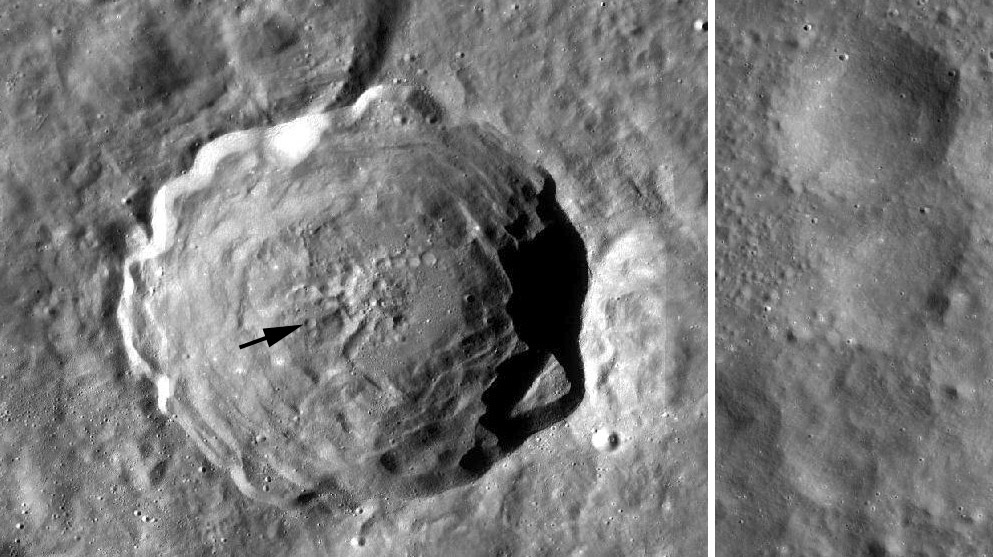Difference between revisions of "May 7, 2013"
| Line 1: | Line 1: | ||
__NOTOC__ | __NOTOC__ | ||
=Rows of Domes= | =Rows of Domes= | ||
| − | |||
<!-- ws:start:WikiTextHeadingRule:0:<h1> --> | <!-- ws:start:WikiTextHeadingRule:0:<h1> --> | ||
<!-- ws:start:WikiTextLocalImageRule:6:<img src="/file/view/LPOD-May7-13.jpg/429420660/LPOD-May7-13.jpg" alt="" title="" /> -->[[File:LPOD-May7-13.jpg|LPOD-May7-13.jpg]]<!-- ws:end:WikiTextLocalImageRule:6 --><br /> | <!-- ws:start:WikiTextLocalImageRule:6:<img src="/file/view/LPOD-May7-13.jpg/429420660/LPOD-May7-13.jpg" alt="" title="" /> -->[[File:LPOD-May7-13.jpg|LPOD-May7-13.jpg]]<!-- ws:end:WikiTextLocalImageRule:6 --><br /> | ||
| − | <em>images from [http://target.lroc.asu.edu/q3/?proj=eqc&center=947556.236141,-4489056.866757&zoom=8&lt=LocationOverlays=llgrid,F,70;moonsunlit,F,40;satview,F,;lroc_feat_images,F,;moon_ft,F,;=InstrumentFootprints=m3_fprints,F,50;nac_fprints,F,100;=SpecialProducts=lndtmcs,F,100;lndtms,F,100;lnpole,F,100;l_lro_mrf,F,100;l_ch1_mrf,F,100;lpjnac,F,100;=M3GlobalMosaics=m3_mosaic_op2c3,F,100;m3_mosaic_op2c2,F,100;m3_mosaic_op2c1,F,100;m3_mosaic_op2b,F,100;m3_mosaic_op2a,F,100;m3_mosaic_op1b,F,100;m3_mosaic_op1a,F,100;=M3SphModelGlobalMosaics=m3_mosaic_sph_op2c3,F,100;m3_mosaic_sph_op2c2,F,100;m3_mosaic_sph_op2c1,F,100;m3_mosaic_sph_op2b,F,100;m3_mosaic_sph_op2a,F,100;m3_mosaic_sph_op1b,F,100;m3_mosaic_sph_op1a,F,100;=Basemaps=lclem_mr,F,100;wac_demclrshd2_128ppd,F,30;lnbrowse,F,100;wac_bw_v1_par,F,100;wac_bw_v1_plus_nacs,T,100;= LRO QuickMap] (NASA/ASU)</em><br /> | + | <em>images from [http://target.lroc.asu.edu/q3/?proj=eqc&center=947556.236141,-4489056.866757&zoom=8&lt=LocationOverlays=llgrid,F,70;moonsunlit,F,40;satview,F,;lroc_feat_images,F,;moon_ft,F,;=InstrumentFootprints=m3_fprints,F,50;nac_fprints,F,100;=SpecialProducts=lndtmcs,F,100;lndtms,F,100;lnpole,F,100;l_lro_mrf,F,100;l_ch1_mrf,F,100;lpjnac,F,100;=M3GlobalMosaics=m3_mosaic_op2c3,F,100;m3_mosaic_op2c2,F,100;m3_mosaic_op2c1,F,100;m3_mosaic_op2b,F,100;m3_mosaic_op2a,F,100;m3_mosaic_op1b,F,100;m3_mosaic_op1a,F,100;=M3SphModelGlobalMosaics=m3_mosaic_sph_op2c3,F,100;m3_mosaic_sph_op2c2,F,100;m3_mosaic_sph_op2c1,F,100;m3_mosaic_sph_op2b,F,100;m3_mosaic_sph_op2a,F,100;m3_mosaic_sph_op1b,F,100;m3_mosaic_sph_op1a,F,100;=Basemaps=lclem_mr,F,100;wac_demclrshd2_128ppd,F,30;lnbrowse,F,100;wac_bw_v1_par,F,100;wac_bw_v1_plus_nacs,T,100;=" rel="nofollow LRO QuickMap] (NASA/ASU)</em><br /> |
<br /> | <br /> | ||
While exploring the LRO QuickMap mosaic of the farside, Maurice Collins noticed odd domes on the floor of Blazhko crater. Blazhko is a relatively fresh, 51 km wide crater. At that diameter it would be expected to have a central peak, but it doesn't have any conspicuous one. And its depth of 4.5 km implies that its floor hasn't been significantly infilled, so this could be the original floor. There are about a dozen flattened domes - but not like familiar mare domes. At the right, NAC images under opposite lighting show the three marked with the arrow. The largest dome is about 2 km wide and perhaps 50 m high. These three are in a line, as are four conspicuous ones at upper right on the floor. Usually a lining up of features suggests an underlying fracture that fed magma to the surface. But are these volcanic domes, fed from a magma source region at some depth under this undoubed impact crater, or are they a peculiar manifestation of impact melt? In large melt ponds melt can be slow to cool and can [http://lpod.wikispaces.com/July+12%2C+2008 act] like true volcanics. Since Blazhko occurs in the middle of the farside highlands where the extra-thick crust makes volcanism even less likely, I will side with the impact melt hypothesis, just as Maurice suggested when he sent me the image.<br /> | While exploring the LRO QuickMap mosaic of the farside, Maurice Collins noticed odd domes on the floor of Blazhko crater. Blazhko is a relatively fresh, 51 km wide crater. At that diameter it would be expected to have a central peak, but it doesn't have any conspicuous one. And its depth of 4.5 km implies that its floor hasn't been significantly infilled, so this could be the original floor. There are about a dozen flattened domes - but not like familiar mare domes. At the right, NAC images under opposite lighting show the three marked with the arrow. The largest dome is about 2 km wide and perhaps 50 m high. These three are in a line, as are four conspicuous ones at upper right on the floor. Usually a lining up of features suggests an underlying fracture that fed magma to the surface. But are these volcanic domes, fed from a magma source region at some depth under this undoubed impact crater, or are they a peculiar manifestation of impact melt? In large melt ponds melt can be slow to cool and can [http://lpod.wikispaces.com/July+12%2C+2008 act] like true volcanics. Since Blazhko occurs in the middle of the farside highlands where the extra-thick crust makes volcanism even less likely, I will side with the impact melt hypothesis, just as Maurice suggested when he sent me the image.<br /> | ||
<br /> | <br /> | ||
| − | <em>[mailto:tychocrater@yahoo.com Chuck Wood]</em><br /> | + | <em>[mailto:tychocrater@yahoo.com" rel="nofollow Chuck Wood]</em><br /> |
<br /> | <br /> | ||
<strong>Related Links</strong><br /> | <strong>Related Links</strong><br /> | ||
Revision as of 22:45, 4 January 2015
Rows of Domes

images from " rel="nofollow LRO QuickMap (NASA/ASU)
While exploring the LRO QuickMap mosaic of the farside, Maurice Collins noticed odd domes on the floor of Blazhko crater. Blazhko is a relatively fresh, 51 km wide crater. At that diameter it would be expected to have a central peak, but it doesn't have any conspicuous one. And its depth of 4.5 km implies that its floor hasn't been significantly infilled, so this could be the original floor. There are about a dozen flattened domes - but not like familiar mare domes. At the right, NAC images under opposite lighting show the three marked with the arrow. The largest dome is about 2 km wide and perhaps 50 m high. These three are in a line, as are four conspicuous ones at upper right on the floor. Usually a lining up of features suggests an underlying fracture that fed magma to the surface. But are these volcanic domes, fed from a magma source region at some depth under this undoubed impact crater, or are they a peculiar manifestation of impact melt? In large melt ponds melt can be slow to cool and can act like true volcanics. Since Blazhko occurs in the middle of the farside highlands where the extra-thick crust makes volcanism even less likely, I will side with the impact melt hypothesis, just as Maurice suggested when he sent me the image.
" rel="nofollow Chuck Wood
Related Links
21st Century Atlas chart F2.



